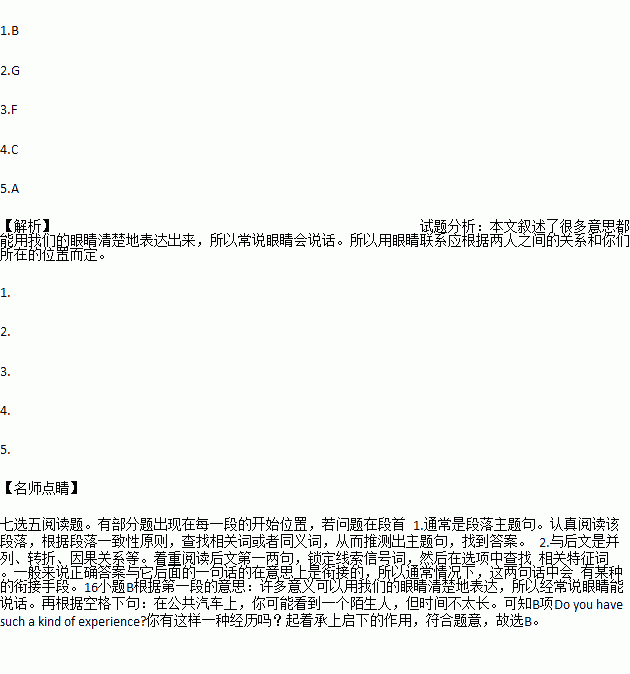题目内容
Much meaning can be conveyed clearly with our eyes, so it is often said that eyes can speak.
1.In a bus you may look at a stranger, but not for too long. And if he sensed that you are staring at him, he may feel uncomfortable.
The same is true in our daily life. If you are stared at for more than necessary, you will look at yourself up and down to see if there is anything wrong with you. 2.. Eyes do speak, right?
Looking too long at someone may seem to be rude and aggressive.3.. If a man stares at a woman for more than 10 seconds and refuses to look away from her, his intentions are obvious. He wishes to attract her attention, and let her know that he is admiring her.
However, when two persons are engaged in a conversation, the speaker will only look into the listener’s eyes from time to time to make sure that the listener does pay attention to what the former is speaking.4.If a speaker looks at you continuously when speaking as if he trying to control you, you will feel awkward. A poor liar usually exposes himself by looking too long at the victim. He wrongly believes that looking straight in the eye is a sign of honest communication. 5.
Actually, eye contact should be made based on specific relationship and situation.
A. On the contrary, it will give him away.
B. Do you have such a kind of experience?
C. That’s what normal eye contact is all about.
D. Actually, continuous eye contact is limi ted to lovers only.
ted to lovers only.
E. After all, everybody likes to be stared at for quite a long time.
F. But things are different when it comes to staring at the opposite sex.
G. If nothing goes wrong, you will feel annoyed at being stared at that way.


 ulti-billionaire Mr. King donates generously to charity several times a year. He gives simply because he wants to help but not for the publicity his donations may bring, and he does not want his good deeds to make news. In other cases, people insist on anonymity because they are afraid of the consequences of revealing their identity. Crime witnesses may be willing to assist the police, but most are unwilling to give their names when reporting a crime.
ulti-billionaire Mr. King donates generously to charity several times a year. He gives simply because he wants to help but not for the publicity his donations may bring, and he does not want his good deeds to make news. In other cases, people insist on anonymity because they are afraid of the consequences of revealing their identity. Crime witnesses may be willing to assist the police, but most are unwilling to give their names when reporting a crime. _.
_. the photo was taken, Donna?s family was living in Florida and Alex?s family called Montreal home. ?I was glad he asked me to marry him before the picture,? Donna said, ?because I know that it?s because he loves me and 10. because he thought it was meant to be, it was fate.?
the photo was taken, Donna?s family was living in Florida and Alex?s family called Montreal home. ?I was glad he asked me to marry him before the picture,? Donna said, ?because I know that it?s because he loves me and 10. because he thought it was meant to be, it was fate.?